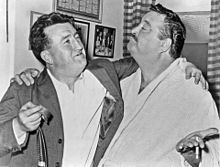
Back برندان بيهان Arabic براندان بيهان ARZ برندان بهان AZB Brendan Behan Catalan Brendan Behan Czech Brendan Behan Danish Brendan Behan German Μπρένταν Μπίαν Greek Brendan Behan Spanish Brendan Behan Estonian
Brendan Behan | |
|---|---|
 Behan (left) with actor Jackie Gleason in 1960 | |
| Born | Brendan Francis Aidan Behan 9 February 1923 Dublin, Ireland |
| Died | 20 March 1964 (aged 41) Dublin, Ireland |
| Occupation | Writer |
| Period | 1942–1964 |
| Genre | Poet, novelist, playwright |
| Subject | Irish republican struggle, often autobiographical |
| Notable works | The Quare Fellow The Hostage Borstal Boy |
| Spouse | |
| Children | Blanaid Behan |
| Parents | Stephen Behan (father) Kathleen Behan (mother) |
| Relatives | Dominic Behan (brother) Brian Behan (brother) |
Brendan Francis Aidan Behan[1] (christened Francis Behan)[2] (/ˈbiːən/ BEE-ən; Irish: Breandán Ó Beacháin; 9 February 1923 – 20 March 1964) was an Irish poet, short story writer, novelist, playwright, and Irish Republican,[3] an activist who wrote in both English and Irish. His widely acknowledged alcohol dependence, despite attempts to treat it, impacted his creative capacities and contributed to health and social problems which curtailed his artistic output and finally his life.[4]
An Irish Republican and a volunteer in the Irish Republican Army (IRA), Behan was born in Dublin into a staunchly republican family, becoming a member of the IRA's youth organization Fianna Éireann at the age of fourteen. There was also a strong emphasis on Irish history and culture in his home, which meant he was steeped in literature and patriotic ballads from an early age. At the age of 16, Behan joined the IRA, which led to his serving time in a borstal youth prison in the United Kingdom and imprisonment in Ireland. During this time, he took it upon himself to study and became a fluent speaker of the Irish language. Subsequently released from prison as part of a general amnesty given by the Fianna Fáil government in 1946, Behan moved between homes in Dublin, Kerry and Connemara and also resided in Paris for a time.
In 1954, Behan's first play, The Quare Fellow, was produced in Dublin. It was well received; however, it was the 1956 production at Joan Littlewood's Theatre Workshop in Stratford, London, that gained Behan a wider reputation. This was helped by a famous drunken interview on BBC television with Malcolm Muggeridge. In 1958, Behan's play in the Irish language, An Giall had its debut at Dublin's Damer Theatre. Later, The Hostage, Behan's English-language adaptation of An Giall, met with great success internationally. Behan's autobiographical novel, Borstal Boy, was published the same year and became a worldwide best-seller.
By the early 1960s, Behan reached the peak of his fame. He spent increasing amounts of time in New York City, famously declaring, "To America, my new found land: The man that hates you hates the human race."[5] By this point, Behan began spending time with various prominent people such as Harpo Marx and Arthur Miller and was followed by a young Bob Dylan.[6] However, this newfound fame did nothing to aid his health or his work, with his alcohol dependence and diabetic conditions continuing to deteriorate. Brendan Behan's New York and Confessions of an Irish Rebel received little praise. He briefly attempted to combat this by a dry stretch while staying at the Chelsea Hotel in New York, and in 1961 was admitted to Sunnyside Private Hospital,[7] an institution for the treatment of alcohol dependence in Toronto, but he once again turned back to alcohol and relapsed back into active alcohol use.
- ^ Brendan Behan: A Life, Michael O'Sullivan, pg 23
- ^ Brendan Behan: A Life, Michael O'Sullivan, pg xi
- ^ "Remembering the Past: Brendan Behan, a rebel and a writer, | An Phoblacht". www.anphoblacht.com. Retrieved 23 March 2022.
- ^ Nolan, Megan (16 March 2024). It must be wonderful to be free. Archive on 4. United Kingdom: BBC Radio 4.
- ^ "NYC – Chelsea – Hotel Chelsea – James Schuyler, Brendan Behan". Flickr. 12 August 2007. Archived from the original on 11 May 2017. Retrieved 25 May 2017.
- ^ "Brendan's tragic voyage: Behan in the USA: The Rise and Fall of the Most Famous Irishman in New York". The Irish Times. Archived from the original on 1 November 2014. Retrieved 25 May 2017.
- ^ "Behan enters alcoholics clinic for treatment". The Globe and Mail. 28 March 1961.